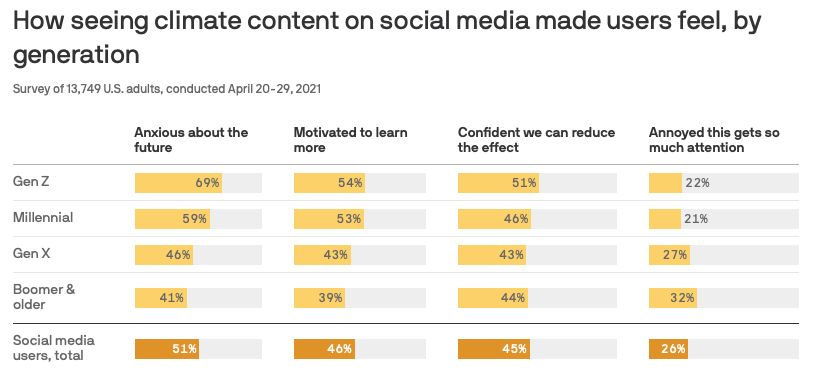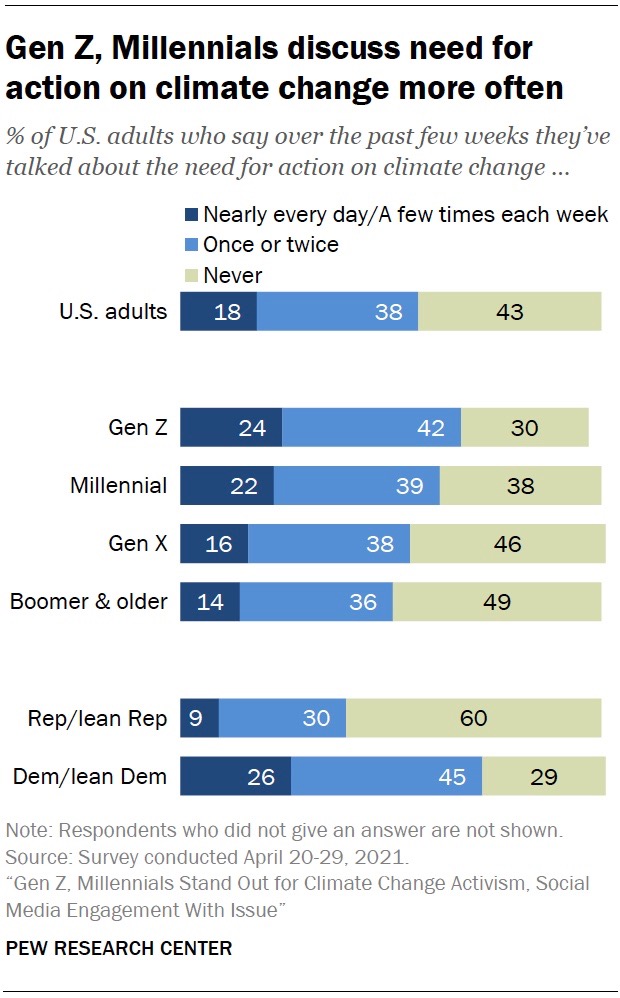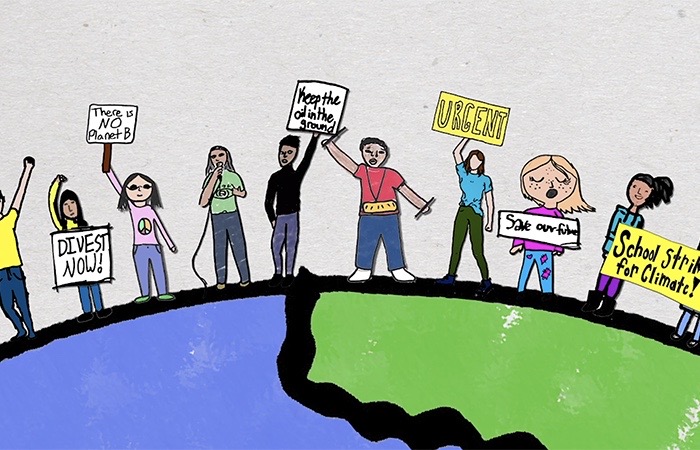Resources
Search below for resources covering the intersection of climate engagement, social science and data analytics.
RESULTS
Environmental Polling Roundup - January 21st, 2022
This post includes climate and environment headlines, data points, and key takeaways from recent public polls - including new polling on the Build Back Better plan and its major clean energy and climate provisions and a new poll assessing voters’ trust in the two parties to handle climate and environmental issues.
Environmental Polling Roundup - December 3rd, 2021
This post includes a roundup of climate and environment headlines, data points, and key takeaways from this week’s public polls - including new polling on the Build Back Better plan, climate agreements made at COP26, and young Americans’ climate attitudes.
Harvard Youth Poll
Most young Americans expect climate change to impact their major life decisions. There is widespread support for climate action and personal connection to the issue. A majority of youth aged 18-29 (55%) believe the U.S. isn’t doing enough to address climate change, while just 14% believe the country is doing too much and 12% say it’s doing enough. Most also believe that the United States should “take the lead in addressing climate change” (53%), as opposed to letting other countries and the United Nations take the lead in addressing the issue (22%). And in their own lives, the majority of young Americans (56%) say they expect climate change to have at least some impact on their future decisions, such as where to live and the kind of work they might do.
Poll Deck: The Changing Public Opinion on Climate Change
This deck from polling firm Global Strategy Group compiles recent public opinion findings on climate and clean energy issues, including the top-testing messaging and language to proactively talk about climate and health, economic impacts, and environmental justice as well as guidance on how to respond to attacks.
(This deck was collected by the Environmental Polling Consortium. If you would like to learn more about the EPC and receive weekly polling insights, please contact epc@partnershipproject.org)
Youth Autonomous Organizing
A collection of interviews, articles, short essays and art - a zine made by youth and community organizers in the Greater Southwest.
Poll: On social media, Gen Z and Millennial adults interact more with climate change content than older generations
- Among U.S. social media users, 45% of Gen Z adults and 40% of Millennials have interacted with content on social platforms that focuses on the need for action on climate change by following an account, liking or commenting on a post, or posting or sharing content about the need for action on climate change.
- Majorities of Gen Z (69%) and Millennial social media users (59%) say it made them feel anxious about the future the last time they saw content on social media about addressing climate change. Fewer than half of Gen X (46%) and Baby Boomer and older social media users (41%) say they felt this way the last time they saw climate content.
- Generations also differ when it comes to positive emotional reactions: 54% of Gen Z and 53% of Millennial social media users say they felt motivated to learn more about climate change issues the last time they saw climate content on social platforms, compared with 43% of Gen X and 39% of Baby Boomer and older users.
- Among climate-engaged social media users, 73% favor phasing out the production of new gasoline-powered cars and trucks by the year 2035, and 54% think the U.S. should phase out the use of fossil fuels in energy production entirely. By contrast, much smaller shares of social media users who do not engage with climate content support either of these two proposals (39% and 27%, respectively).
Poll: Gen Z, Millennials Stand Out for Climate Change Activism, Social Media Engagement With Issue
Target Millennials and Gen Z. This survey finds that people born 1981 to 1996 (Millennials) and after 1996 (Generation Z) are especially anxious, motivated and angry about climate change. They talk about the issue more, engage with climate content more on social media, and are more likely than older Americans to take climate action. The survey, conducted in April 2021, also reveals that 50 percent of Americans experienced extreme weather in the past year.
Poll: Young Americans Want to Do More to Address Climate; Support for Civilian Climate Corps, Environmental Justice Initiatives
A broad majority young Americans understand anthropogenic climate change, but many are struggling to identify individual practices they can take to improve global sustainability, according to a survey of 15-25 year olds on climate change, environmental justice, and related public policy initiatives.
- 38% call climate change a crisis, 31% say it’s a problem, 12% a concern, 9% a non-issue, and 8% label it fiction.
- While 44% of young Americans are either "very" (21%) or "somewhat" (23%) optimistic the world will successfully address climate change, 47% are either "somewhat" (12%) or "very" (25%) pessimistic
- Respodents expressed a strong desire to do their part in mitigating climate change, but many were unsure how:
- 27% of respondents say they have reduced their usage of single-use plastics, 14% take alternate transportation, and 12% have curtailed electrical use. Another 14% have participated in a march or protest, and 10% have volunteered to create change. 67% have shared climate information on social media. (89% report they get the majority of their news from social media.)
- 67% of respondents report they do not believe U.S. residents are equally protected against exposure to pollution and other ecological hazards and 37% characterize environmental justice in the U.S. as "extremely inequitable."
- The survey also found significant support for many of President Biden’s environmental actions.
2021 Redford Center Stories “Best Of” Montage
Listen to the youth. This montage of some of the 400 short films submitted for annual youth filmmaking challenge is an urgent call for climate justice. Speaking in plain language and using simple-yet-creative graphics, these youth offer a fresh perspective on the climate crisis. Many of their messages are about what can be achieved through working together. Their honesty, directness and positivity have the potential to compel a wide variety of audiences to join them.
A question of morals? The role of moral identity in support of the youth climate movement Fridays4Future
When drumming up support for a movement, remind people of their moral identity - that is, the extent to which they feel that moral traits (such as being fair, caring, and kind) are important to who they are as a person. This survey study finds that the strength of an individual's moral identity is significantly associated with their support for an emerging youth climate movement, Fridays4Future. However, given that this study uses a convenience sample of German adults and focuses on a highly polarizing social movement in Europe, caution should be taken when generalizing this result to the U.S.
Pagination
- Previous page
- Page 5
- Next page





